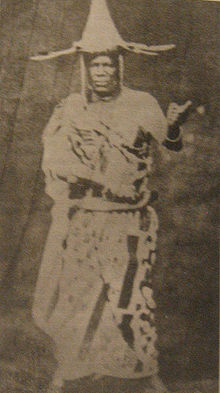Jaja of Opobo
| King Jaja of Opobo | |
|---|---|
| Amanyanabo | |
 King Jaja of Opobo, Opobo | |
| Reign | 25 December 1870–September 1887 |
| Coronation | 25 December 1870 |
| Predecessor | None |
| Successor | Loolo |
| Born | c. 1821 Opobo[citation needed] |
| Died | c. 1891 |
| Burial | |
| House | Ubani |
| Dynasty | Jaja |
| Father | Ozurumba |
| Mother | Uru |
| Religion | Christianity |
King Jaja of Opobo (full name: Jubo Jubogha; 1821–1891) was a merchant prince and the founder of Opobo city-state in an area that is now the Rivers state of Nigeria. Born in Umuduruoha Amaigbo in Igboland, he was taken at about the age of twelve as a slave in Bonny by Obua Ajukwu of Oguta, who had come to Bonny to buy slaves. Jumo Jumofe later took the name "Jaja".
Jaja earned his way out of slavery; he was enculturated according to Ijaw (Ibani) rituals and rose to head the Anna Pepple House merchant faction of Bonny Island. Under him, Anna Pepple absorbed other trade houses until a dispute with the Manilla Pepple House led by Oko Jumbo compelled Jaja to break away to form the Opobo city-state (26 miles east of Bonny) in 1869.
Opobo came to dominate the region's palm oil trade, and controlled fourteen of what were formerly Bonny's eighteen trade houses. Jaja blocked the access of British merchants to the interior effectively monopolizing trade; Opobo also shipped palm oil directly to Liverpool, independent of British middlemen.
At the 1884 Berlin Conference the Europeans designated Opobo as British territory. When Jaja refused to cease taxing the British traders, Henry Hamilton Johnston, a British vice consul, invited Jaja for negotiations in 1887. Jaja was arrested on arrival aboard a British vessel he was tried in Accra in the Gold Coast (now Ghana) then exiled him to London and then Saint Vincent in the West Indies and Barbados.[1]
In 1891, Jaja was granted permission to return to Opobo, but died en route. Following his exile and death, the power of the Opobo state rapidly declined.
See also
- Legends of Africa
- https://www.youtube.com/watch?v=az6b5avH_Zc - the quintessential King Jaja song
Sources
- Cookey, S.J.S (2005). King Jaja of the Niger Delta: His Life and Times 1821 - 1891. UGR publishing. ISBN 0-9549138-0-9. Retrieved 2010-10-14.
{{cite book}}: Invalid|ref=harv(help)
